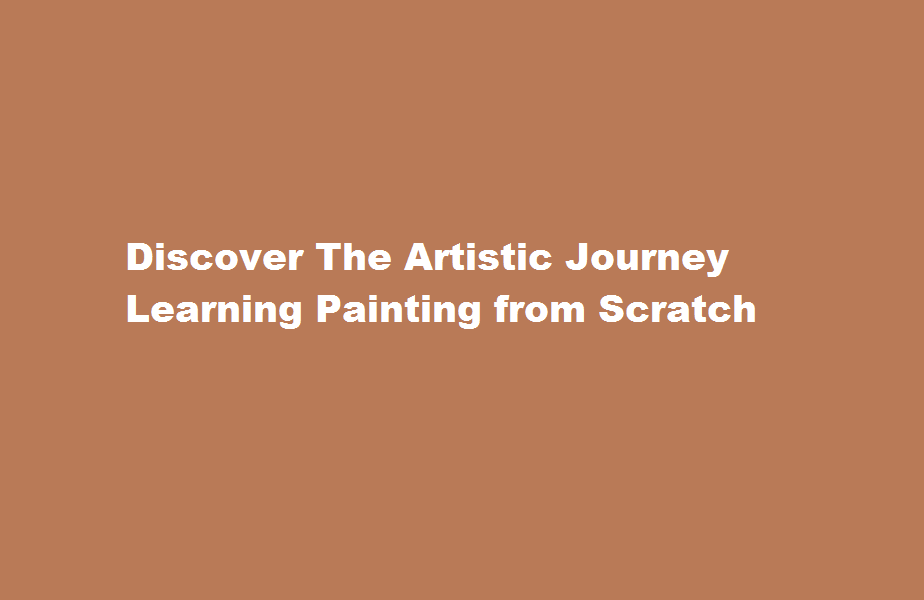Discover The Artistic Journey Learning Painting from Scratch
4 min read
Introduction
Painting is a captivating form of artistic expression that allows individuals to unleash their creativity and connect with their inner thoughts and emotions. Learning to paint from scratch can be an exciting and rewarding endeavour. Whether you are a complete beginner or have dabbled in art before, this article will provide you with a step-by-step guide to embark on your painting journey. By following these practical tips and techniques, you will gain a solid foundation in painting and develop the skills necessary to create captivating works of art.
Gather Your Materials
To start your painting journey, it’s essential to gather the necessary materials. Invest in quality art supplies such as brushes, paints (acrylic, oil, or watercolour), a palette, canvas or paper, and an easel. Quality materials can significantly enhance your painting experience and ensure better outcomes.
Begin with Basic Techniques
Mastering basic painting techniques is crucial when learning from scratch. Start by learning about colour theory, understanding primary and secondary colours, and exploring various colour combinations. Practice brushwork techniques, such as dry brushing, wet-on-wet, glazing, and blending. Experiment with different brush sizes and strokes to create varying textures and effects. These foundational techniques will lay the groundwork for your artistic development.
Learn from Tutorials and Online Resources
In the digital age, there are abundant resources available online to help you learn painting. Seek out tutorials, online courses, and instructional videos that cater to beginners. Platforms like YouTube, Udemy, and Skillshare offer a wealth of painting tutorials covering various styles and mediums. Take advantage of these resources to learn new techniques, gain insights from experienced artists, and broaden your artistic horizons.
Study the Masters
To deepen your understanding of painting, study the works of renowned artists. Visit art museums, galleries, and exhibitions to observe the techniques and styles employed by the masters. Analyse their use of colour, composition, brushwork, and subject matter. Many artists also publish books and guides that provide valuable insights into their artistic processes. By studying the works of the masters, you can gain inspiration and incorporate their techniques into your own creations.
Practice Regularly and Experiment
Consistent practice is key to improving your painting skills. Set aside dedicated time for painting, even if it’s just a few hours a week. Experiment with different subjects, styles, and mediums to expand your artistic repertoire. Don’t be afraid to make mistakes or take risks—painting is a process of exploration and self-expression. Embrace the journey and learn from each painting, as it is through practice and experimentation that you will develop your unique artistic voice.
Seek Feedback and Join Art Communities
Sharing your artwork with others and seeking feedback can be immensely valuable. Join local art communities, take part in workshops, or participate in online forums and social media groups. Engaging with fellow artists and receiving constructive criticism will help you refine your skills and gain fresh perspectives. Additionally, networking with artists can lead to collaborative opportunities and further enhance your artistic growth.
Frequently Asked Questions
What’s the first thing to learn in painting?
An essential skill to learn as a beginning artist, whether drawing or painting, is perspective. If you want to achieve three-dimensional art, knowing perspective is key, including how to find the horizon line, determine the vanishing point and an overview of linear perspective.
How many types of painting are there?
There are more than 75 types of painting styles in art today since the beginning of art history. A painting can be classified into an era just by looking at its painting style.
Conclusion
Embarking on the journey of learning painting from scratch is an exciting and enriching endeavour. By gathering the necessary materials, mastering basic techniques, utilising online resources, studying the masters, practising regularly, and seeking feedback, you can develop your skills and create captivating artworks. Remember, the joy of painting lies not only in the final result but also in the process itself. Embrace your creativity, express your unique vision, and let the colours flow onto the canvas. With dedication, patience, and a willingness to explore, you will unlock your artistic potential and enjoy a lifelong journey of self-expression through painting.
Read Also : Recovering a Deleted Gmail Account A Comprehensive Guide






